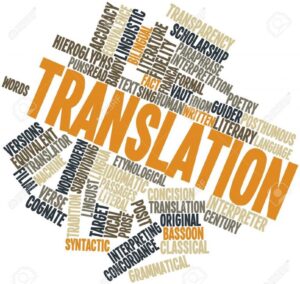 An online workshop presented by Sonia Colina and Sara Albrecht, University of Arizona.
An online workshop presented by Sonia Colina and Sara Albrecht, University of Arizona.
The deadline to apply to participate in this event was October 18th.
Pedagogical translation is making a comeback in the multilingual language classroom as an activity that promotes literacy, metalinguistic and cultural awareness, translanguaging, language diversity, and community engagement. While theoretical papers on this topic are becoming more common, practical guidance for teachers on how to incorporate translation in their curriculum in an informed manner is scarce. After briefly reviewing the historical context that banned translation, the justification for its reintroduction, and the roles translation can serve in language learning, (see past webinar, and Incorporating Translation in the World Language Classroom), the presenters will work with participants to help them create their own lesson plans and activities for introducing translation in their multilingual language classrooms. Participants will be asked to submit a draft lesson/idea to work on in the workshop.
➣ Participants must apply to take part in this small interactive workshop.
Because of the hands-on nature of this event, registration will be capped at 15 people. In order to give registration priority to those who can benefit the most from the workshop, prospective attendees must submit an application by October 15. The application requires the following information:
- Your contact information and institution details.
- The grade level(s) and language(s) you teach.
-
The kind of translation lesson you would you like to plan (for examples, see https://opentextbooks.library.arizona.edu/scolina/). Applicants will select from the following: bilingual editions of children’s books, translation of proverbs, advertising and marketing campaign, other
- The topic or theme of a lesson you plan to bring.
- A link to a shared Google document with a draft of your lesson that you will be working with during this workshop
Applicants will be notified of their acceptance status on October 22nd, and must register for the event by October 27th (their acceptance email will tell them how to do so).
This webinar is part of a larger CERCLL project, Cross-Cultural Thinking Through Translation and Interpretation, created in partnership with the National Center for Interpretation and the Department of Spanish & Portuguese at the University of Arizona.
Bios:
Dr. Sonia Colina is Professor of Spanish and Director of the National Center for Interpretation at the University of Arizona, where she teaches Spanish linguistics, translation studies and coordinates the Online Translation Certificate. In her translation studies research, she specializes in applied linguistics and translation, translation quality assessment, pedagogy of translation, and translator education. She is the author of Fundamentals of Translation (CUP, 2015), of Translation Teaching: from Research to the Classroom (McGraw-Hill, 2003), and of numerous articles in edited volumes and translation journals (e.g., Target, The Translator). In addition, she has published on the relationship between translation studies and language teaching, most recently “Translation in Spanish Language Teaching: the Integration of a “fifth skill” in the Second Language Curriculum,” coauthored with Barbara Lafford (Journal of Spanish Language Teaching, 4:2). Dr. Colina is the Principal Investigator for the CERCLL funded project “Cross-cultural thinking through translation and interpretation.”
Sarah Albrecht is a doctoral candidate in Language, Reading and Culture at the University of Arizona, where she teaches linguistics for pre-service teachers. She is interested in equitable language education and in teaching courses in linguistics, heritage and second-language pedagogy, and bilingual education. Her research interests are related. They include pedagogies for combined or separate heritage and second language courses, biliteracy, bilingualism, and bridging the gap between bilingual education in the primary grades and heritage language education in the secondary grades. Her publications about dialect awareness, heritage language teaching, and intercultural competence also reflect these interests, as do collaborations regarding pre-service teacher preparation in bilingual education and this ongoing work on translation.
Participants attending this event can request a certificate of attendance for 3 hours of Continuing Education during the live event; or they can request a digital badge after the event.
Participants requiring closed captions at the time of CERCLL’s events should request this at least a week in advance by emailing CERCLL at cercll@email.arizona.edu.

